League of Professional Theatre Women Gilder/Coigney International Theatre Award
The International Committee of The League of Professional Theatre Women led by Shellen Lubin and Catherine Porter as Co-Presidents, an organization which has been
championing women in the professional theater for over three decades, has chosen
Hanane Hajj Ali of Lebanon to receive the 2020 Gilder/Coigney International Theatre Award.
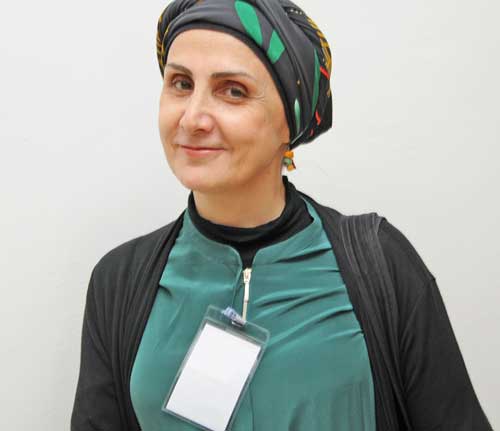
Hanane Hajj Ali of Lebanon, Recipient of the 2020 League of Professional Theatre Women Gilder/Coigney International Theatre Award
Established in 2011, the League of Professional Theatre Women Gilder/Coigney International Theatre Award was created and honor of Rosamond Gilder and Martha Coigney, two legendary theater women whose work on the international stage proved that theater knows no international boundaries.
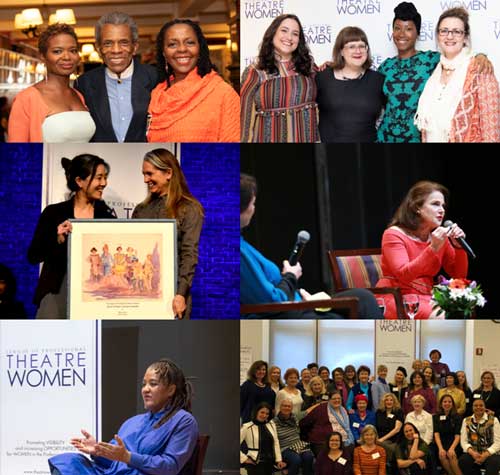
Presented every three years, this Award acknowledges the exceptional work of theater
women around the world and aims to make a difference in the life and career of an
international woman theater artist as she has made in the lives of her audiences and
her culture. Odile Gakire Katese from Rwanda was the inaugural recipient of the G/C
Award in 2011. Patricia Ariza from Colombia received the award in 2014 and Adelheid Roosen from the Netherlands was honored in 2017.
The 2020 Award will be presented on Tuesday, October 20, 2020 at the Martin E. Segal Theatre Center/CUNY. Other Award Week events are in the planning process and will highlight all of the nominees with performances, workshops, readings and panel discussions.
Fluent in English, French and Arabic, Hanane Hajj Ali is a woman who defies
conventions, stereotypes and expectations. She is a singular ambassador
representing the breadth and depth of the evolving identities and realities for Arab
women and Arab world theater.
Throughout her 40-year career, she has written, performed and directed acclaimed Arabic-language productions and also facilitated and supported hundreds of colleagues, students and communities in Lebanon and throughout the entire Middle East-North Africa (MENA) region.
Ali's artistic career started as a founding member of Hakawati/Storytellers Theater in 1978, the Arab world’s pioneering experiment in socially engaged community led theater, where she was an actor and writer until 1992.
In 1999, she co-founded Shams Association which bridges the sectarian divides of Lebanese society and brings together young artists from different backgrounds. “Jogging”, her solo piece, is "partly autobiographical and a taboo-breaking performance that tackles the Bermuda triangle of Religion, Sex, and Politics" which has toured throughout the Middle East and Europe.
Hanane Hajj Ali of Lebanon, Recipient of the 2020 League of Professional Theatre Women Gilder/Coigney International Theatre Award
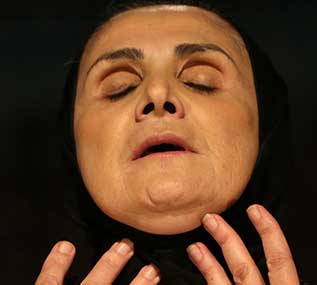 As a teacher and trainer, Hanane has worked with hundreds of young people across the Middle East, and has led sessions on theater practice, leadership, cultural management and cultural policy. Ali remains an activist, cooperating with numerous NGO’s and co-founding three of the Arab region’s most important cultural organizations: Al Mawred’s Culture Resource, Ettijahat and Action for Hope.
As a teacher and trainer, Hanane has worked with hundreds of young people across the Middle East, and has led sessions on theater practice, leadership, cultural management and cultural policy. Ali remains an activist, cooperating with numerous NGO’s and co-founding three of the Arab region’s most important cultural organizations: Al Mawred’s Culture Resource, Ettijahat and Action for Hope.
According to Hanane Hajj Ali, on her daily jogging route through Beirut, Lebanon, she started jogging as exercise – to avoid stress and fend off osteoporosis. Along the way, she began to see the streets of her city with new eyes. As she considered the city’s history of building and destruction through war, she thought about her roles of woman, wife and mother. She examined her dreams and desires. And she thought about Medea.
“The common element in all of my performances in Lebanon has been shock,” said Hajj Ali in The National during the 2017 Edinburgh Fringe Festival, where “Jogging” was featured in the lineup for “Arab Arts Focus Edinburgh.”
“After once playing the show in a part of Lebanon that was ruled by a group averse to the ideas that I was presenting, an audience member walked up to me and asked if I was afraid for my life, as people had certainly been killed for less in the country. I answered by asking: ‘Why should I be afraid? Am I not portraying real life? All I’m doing is using my artistic background to portray reality.’”
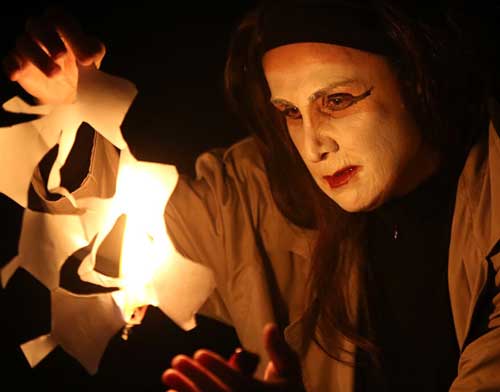
Hanane Hajj Ali of Lebanon, Recipient of the 2020 League of Professional Theatre Women Gilder/Coigney International Theatre Award
Twenty-seven women theatre artists from eighteen countries were nominated on the basis of work demonstrating artistic excellence and support of women’s work and issues and that inspires and educates across cultures. Awardee Hanane Hajj Ali was chosen from a group of four finalists that also included: Iman Aoun (Palestine), Mallika Sarabhai (India), and Maya Zbib (Lebanon). Mihaela Drăgan (Romania) will receive a special certificate of achievement.
The other nominees include: Jaspreet Saund (Canada), Beate Seidel (Germany), Avra
Sidiropoulou (Greece), Andrea Tompa (Hungary), Kalpana Gagdekar (India),
Deirdre Kinahan (Ireland), Edna Mazya (Israel), Burbuqe Berisha (Kosovo), Illire
Vinca (Kosovo), Zana Hoxha Krasniqi (Kosovo), Sherry Lara Alingod (Philippines),
Jung-Soon Shim (Republic of Korea), Lupe Gehrenbeck (Venezuela), Jill
Greenhalgh (Wales), Hope Azeda (Rwanda), Dijana Milosevic (Serbia), Grace
Gachocha (Tanzania), Jalila Baccar (Tunisia), Sarah Berger (England), Faynia
Williams (England), Katy Lipson (England), and Lucy Kerbel (England). [You can read interviews with some of these amazing artists and producers in ‘Spotlight on International Artists’ in this Issue.]
The League of Professional Theatre Women has been championing women and leading the gender parity conversation in the professional theater for over three decades. Since its founding, the LPTW’s membership has grown to more than five hundred theater artists and practitioners of all backgrounds, across multiple disciplines, working in the commercial and non-profit sectors.
To increase visibility of and opportunities for women in the field, The League of Professional Theatre Women spearheads public programming, advocacy initiatives, events, media, and publications that raise awareness of the importance of nurturing women’s voices, celebrate industry luminaries, preserving the legacy of historic visionaries, and working to shine a spotlight on the imperative of striving for gender parity and fostering a diversity of expression, both in the theater world and the world at large.
The Oral History Project is an ongoing project made possible by generous grants from the Edith Meiser Foundation, the Betty R. and Ralph Sheffer Foundation, and private sponsors. The Oral History Project is produced by Betty Corwin at the New York Public Library for the Performing Arts at Lincoln Center, and chronicles and documents the contributions of significant theater women in many fields. Interviews with such outstanding women are videotaped and housed in the Theatre on Film and Tape Archive at the New York Public Library for the Performing Arts at Lincoln Center.
For info: www.theatrewomen.org
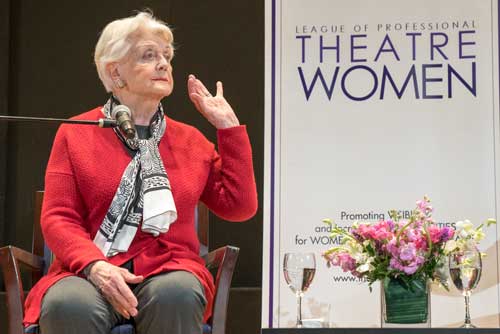
Dame Angela Lansbury speaking at Lincoln Center’s Library for the Performing Arts, as part of the League of Professional Theatre Women’s Oral History Project. The Talk began with an introduction by Ludovica Villar-Hauser. Then, Charlotte Moore, Artistic Director of Irish Repertory Theatre, continued a spirited discussion with the Stage, Film, and Television Actress.
























